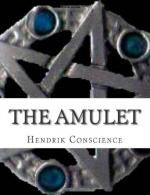“We will see which of us will the more coolly perform his part of the task. You are mistaken, signor; fear does not disturb me. Sympathy for you suggested the train of thought, and I considered it my duty to place before your eyes once more the abyss into which you might fall.”
“Be silent; it is too late,” exclaimed Simon Turchi, beside himself with rage. “Fool, do you desire my ruin—my eternal dishonor? Shall I let my enemy live? Shall I let him—him the husband of Mary Van de Werve—look down upon me from the height of his grandeur and felicity? No, no. I myself will be, must be, happy, rich, prosperous; and even should all escape my grasp; should the scaffold be my lot, the rage of vengeance which lacerates my heart must be satisfied.... Nothing, nothing, can restrain me; and, Julio, were you an obstacle in my path, I would pass over your dead body to strike a fatal blow at him who has poisoned my life. Do not attempt to thwart me, or I will crush you where you stand.”
At these words Simon Turchi placed his hand on the hilt of his sword; his face was scarlet, his lips trembled, and his eyes flashed.
This threat did not disturb Julio, probably because he thought his master could not execute it. An ironical smile played upon his lips; he stepped back one or two paces, drew his knife, and said, mockingly:
“It would be strange, signor, if Geronimo should find us engaged in a combat. It might save his life.”
“What! would you dare?”
“Why not? Do you think Julio would permit himself to be led like a sheep to the slaughter?”
“Listen! Ho comes!” exclaimed Simon Turchi, starting with terror.
The repeated strokes of the knocker resounded through the court-yard where the little door gave entrance into the garden.
“Julio, I ask you again,” said Turchi, anxiously, “what reliance I may place upon you?”
“I will do what I have promised—neither more nor less.”
“Then go open the door. Be guarded in your words, and show no disquietude. Bring him to this room; tell him that I am engaged with the foreign merchant; if he does not sit down at once, watch a favorable moment to lead him to the arm-chair. Then call me and I will do the rest.”
“You, then, are determined to make me entice the Signor Geronimo to sit down in the arm-chair?”
Turchi replied in a threatening voice and with flashing eyes:
“Pietro Mostajo, remember the Superintendent of Lucca.”
Julio left the building, went to the garden-gate and opened it.
“Benvenuto, Signor Geronimo,” he said, “what good luck brings you here on a visit to my master? It is a long time since we have seen you.”
“It is indeed a long time,” replied the young noble with a genial smile, as he walked towards the house. “But the place looks so wild and uncared for. Did not the Signor Turchi speak of having the garden put in order?”




